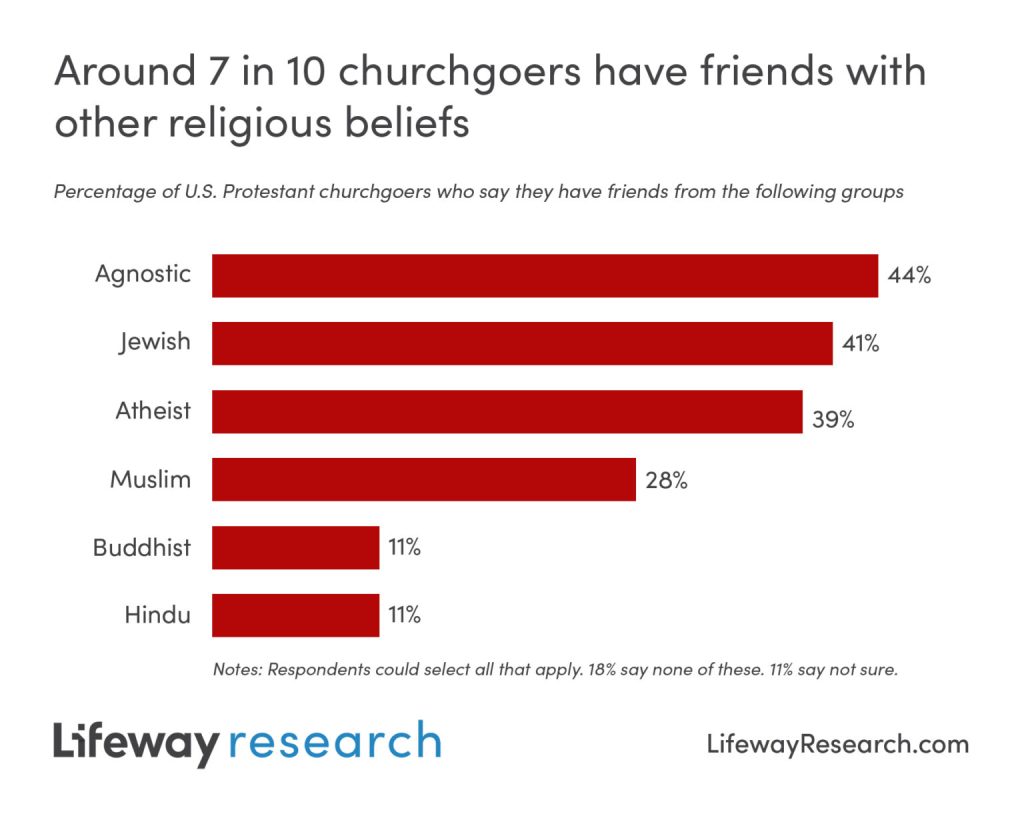This article was originally written by Aaron Earls and published to Lifeway Reasearch.
At church, churchgoers are surrounded by people who share their religious beliefs, but that doesn’t prevent them from having friends who believe differently.
Most U.S. Protestant churchgoers (71%) say they currently have friends with different religious beliefs, according to a Lifeway Research study. Around 2 in 5 say they have agnostic (44%), Jewish (41%) or atheist friends (39%). More than a quarter (28%) have Muslim friends. Around 1 in 10 report having Buddhist (11%) and Hindu (11%) friends. Around 1 in 5 (18%) say they don’t have friends from any of these. Another 11% aren’t sure. On average, churchgoers have friends from at least two other religious groups.
“Most Christian churchgoers do not live in a religious bubble. They have friends who are not Christians and have talked about faith enough to know what type of religious beliefs they have,” said Scott McConnell, executive director of Lifeway Research.
Around 2 in 3 Americans identify as Christian, according to both Pew Research and Gallup. Close to 3 in 10 are religiously unaffiliated, and fewer than 1 in 10 identify as one of the other religions. Jews, Muslims, Buddhist and Hindus are each around 1%.
Inter-religious friendships
Some demographics of churchgoers are more likely than others to have friends from other religious groups. In general, churchgoers who are younger, male and have additional formal education are more likely to have relationships beyond their faith background.
Protestant churchgoers who are 18-34 years old are among the most likely to say they have agnostic (56%), Muslim (40%) and Buddhist friends (15%). They are also among the least likely to say they don’t have friends from any of the other religions (13%). Those who are 65 and older are among the most likely to say they don’t have any inter-religious friendships (20%), but they are also among the most likely to say they have Jewish friends (44%).
Female churchgoers are more likely than male churchgoers to say they don’t have friends from other religious groups (23% v. 14%). Men are more likely than women to report having Jewish (46% v. 36%), Muslim (35% v. 22%) and Hindu friends (14% v. 8%).
Those with a high school education or less are among the most likely to say they aren’t friends with people with other religious beliefs (22%). They are also among the least likely to say they have Jewish (35%), atheist (31%) or Buddhist friends (8%).
Ethnically, African Americans are the most likely to have Muslim friends (54%), while white Americans are the least likely (20%). Protestant churchgoers who aren’t white, African American or Hispanic are the most likely to have Buddhist friends (34%) and among the most likely to have Jewish friends (55%).
Where churchgoers live also plays a role in their friendships. Those in the Northeast are among the most likely to have Jewish (50%), Muslim (38%) and Hindu friends (17%).
“How diverse the religious beliefs of your friends are can be related to how many people of other faiths work with or live near you,” said McConnell. “Proximity creates opportunities for friendships that cross religious lines, but Christians also have to be willing to meet and get to know people who have different beliefs.”
Religious differences
Among Protestant churchgoers, different denominations, church sizes and theological beliefs can play a role in the likelihood someone has a non-Christian friend.
Churchgoers at Restorationist movement congregations (26%), Methodists (25%), Lutherans (21%) and Baptists (20%) are among the most likely to say they aren’t friends with anyone from other religions. Non-denominational churchgoers (10%) are less likely to say so.
Different denominations, however, are more likely than others to have friends from specific religious groups. Those attending a non-denominational congregation are among most likely to have Jewish (47%), atheist (43%), Muslim (31%) and Hindu friends (15%). Presbyterian/Reformed churchgoers are among most likely to have Jewish (54%) and Muslim friends (35%).
Baptists are among the most likely to have atheist (38%) and Muslim friends (33%) but among the least likely to have Jewish friends (36%). Similarly, Methodists are among the most likely to have Muslim friends (36%) and among the least likely to have Jewish friends (15%). Lutherans are among the most likely to have atheist friends (39%) but among the least likely to have Muslim friends (16%).
Meanwhile, churchgoers at Restorationist movement congregations are among the least likely to have agnostic (26%), atheist (24%), and Buddhist friends (5%).
Those who attend a church of 500 or more are among the least likely to say they don’t have friends from any other religion (10%), while those at the smallest churches, with fewer than 50 in worship attendance, are among the most likely to say so (22%).
U.S. Protestant churchgoers without evangelical beliefs are more likely than those with such beliefs to have atheist friends (43% v. 35%), Muslim friends (34% v. 23%), Buddhist friends (14% v. 9%) and Hindu friends (14% v. 8%).
“Those with evangelical beliefs strongly agree it is very important that they personally encourage non-Christians to trust Jesus Christ as their Savior, but they have fewer relationships with people of other faiths that churchgoers who don’t feel this responsibility,” said McConnell. “Either they are sharing the gospel with strangers in these groups, or they are not being proactive in their convictions.”
For more information, view the complete report.






